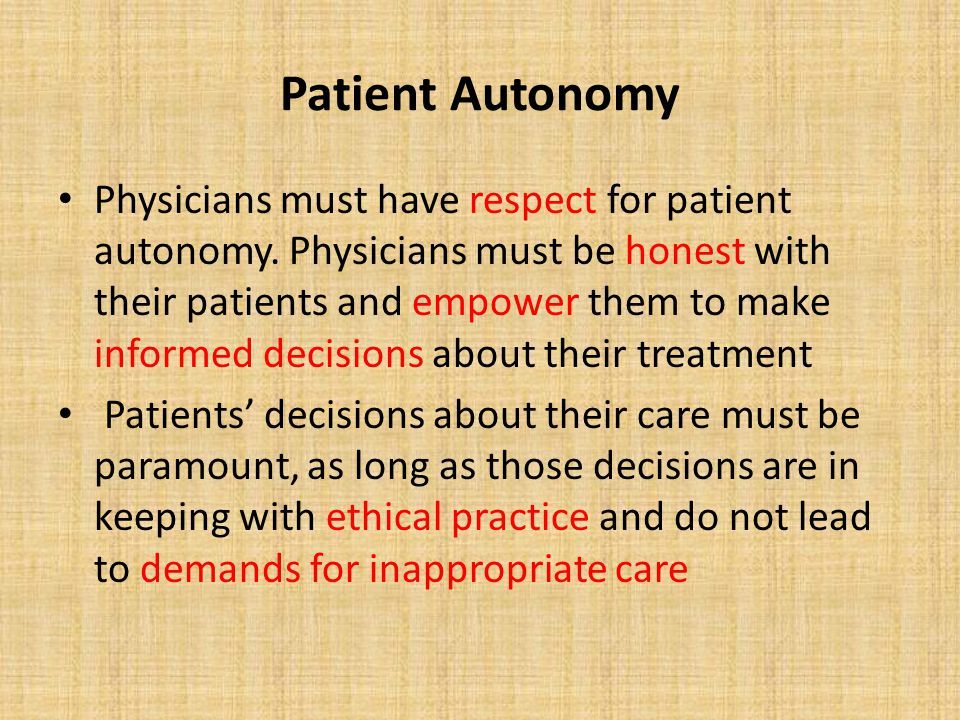
(for English, scroll down)
Το δικαίωμα του ασθενούς στην αυτονομία είναι αναφαίρετο. Τουλάχιστον στην θεωρία. Η αυτονομία του ασθενούς υπηρετείται όταν ο ασθενής ενημερώνεται έγκυρα για τα όποια οφέλη και παρενέργειες μίας προτεινόμενης θεραπείας. Μία τέτοια ενημέρωση πρέπει να στηρίζεται στην ειλικρίνεια, στην εντιμότητα. Η ίδια η σχέση ασθενούς-ιατρού πρέπει να στηρίζεται στην ειλικρίνεια και εντιμότητα. Οι ιατροί δεν πρέπει να “εξαγοράζουν” την ευνοϊκή γνώμη των ασθενών τους ψευδόμενοι ή, έστω, μη διορθώνοντας τις όποιες παρανοήσεις μπορεί να έχει στο μυαλό του ο ασθενής. Οι ιατροί δεν πρέπει να παραπλανούν τους ασθενείς τους στο να ακολουθήσουν ακριβές και ενίοτε επικίνδυνες “θεραπείες”, τόσο ενεργητικά (π.χ. με το να υπερτονίσουν τα οφέλη μίας θεραπείας) όσο και παθητικά (π.χ. με το να μην αναφέρουν ή να μειώσουν τις παρενέργειες μίας θεραπείας). Δεν χτίζεται έτσι η εμπιστοσύνη, δεν χτίζονται έτσι οι ώριμες σχέσεις.
Μια σχέση που στηρίζεται σε ανακρίβειες και μισόλογα δεν είναι αυτή που θα μας βοηθήσει όταν έρθουμε αντιμέτωποι με την πραγματικότητα. Και είναι τότε, την ώρα της κρίσης, που ένας έμπιστος ιατρός είναι πιο αναγκαίος από ποτέ. Το τελευταίο που έχει ανάγκη εκείνη την δύσκολη ώρα στην υγεία και την ζωή του ένας ασθενής είναι να αντιληφθεί ότι κάποιον καιρό πιο πριν, την ώρα της ενημέρωσης, ο ιατρός του δεν ήταν ειλικρινής, δεν ήταν έντιμος, δεν σεβάστηκε και δεν υπηρέτησε την αυτονομία του. Το τελευταίο που εχει ανάγκη είναι να δοκιμάσει την απογοήτευση από τον ιατρό του και την Ιατρική, είναι να νιώσει προδωμένος, είναι να νιώσει εγκαταλειμένος, είναι να νιώσει μόνος.
Τι αξία άλλωστε έχει η Ιατρική εάν προδώσει την βασική ανάγκη των ανθρώπων να βοηθήσουν και να βοηθηθούν, να ακούσουν και να ακουστούν…;
Τι αξία έχει η Ιατρική εάν είναι εκτεθειμένη ηθικά…;
———————-
Δείτε παρακάτω δύο παραδείγματα όπου η αυτονομία των ασθενών δεν υπηρετείται κατάλληλα, παραδείγματα όχι σπάνια, αλλά αντιθέτως από το ψωμοτύρι της καθημερινής ιατρικής πράξης.
1. Το παράδειγμα του μεταστατικού καρκίνου του πνεύμονα και του παχέος εντέρου.
“Overall, 69% of patients with lung cancer and 81% of those with colorectal cancer did not report understanding that chemotherapy was not at all likely to cure their cancer.”
“… the risk of reporting inaccurate beliefs about chemotherapy was higher among patients … who rated their communication with their physician very favorably, as compared with less favorably (odds ratio for highest third vs. lowest third, 1.90; 95% CI, 1.33 to 2.72).”
Διαβάστε το άρθρο από το New England Journal of Medicine εδώ: http://www.nejm.org/doi/full/10.1056/NEJMoa1204410…
2. Το παράδειγμα της σταθερής στεφανιαίας νόσου.
“In the JAMA survey study, about 70% of participants INCORRECTLY (my emphasis) believed that angioplasty would lower their chance of having a heart attack. After receiving more information, the number of people with that FALSE BELIEF (my emphasis) dropped by half.” http://www.health.harvard.edu/…/doctors-oversell-artery-ope…
Διαβάστε τις δύο πρωτότυπες ερευνητικές μελέτες (ολόκληρο το κείμενο διαθέσιμο δωρεάν) καθώς και ένα σχετικό σχόλιο όπως πρωτοδημοσιεύτηκαν στο JAMA Internal Medicine, στο τεύχος Οκτωβρίου 2014, http://archinte.jamanetwork.com/issue.aspx…
————————————————————
Doctors’ honesty and patient autonomy
The patient’s right to autonomy is indisputable. At least in theory. The patient’s autonomy is best served when the patient is accurately being informed about the benefits and side effects of a proposed therapy. Such information should be presented with sincerity, with honesty. The same patient-doctor relationship should depend on sincerity and honesty. Doctors should not “buy” their patients’ favourable opinion for them by lying to them or even by letting “misconceptions” uncorrected. Doctors should not misinform their patients in following expensive and often dangerous “therapies”, neither actively (e.g. by overstating the benefits of a therapy), nor passively (e.g. by understating the side effects of the therapy). That is not how real trust is built. That is not how mature relationships are built.
A relationship built on lies and half-truths will not help us when we will need to face reality. And, inevitably, at some point, the patient will face reality. And it is then, at the time of the real crisis, that a trustworthy doctor will be most needed, not earlier. The last thing a patient needs at that difficult and trying times in his health and his life is to realise that some time earlier, at the time of getting informed by his doctor, the latter was not sincere, was not honest, did not respect and serve his right to autonomy. The last thing he needs is to feel disappointed by his doctor, disappointed by Medicine, is to feel betrayed, is to feel abandoned, is to feel alone.
What is the value of Medicine, after all, if it betrays people’s basic need to help and to be helped, to listen and to be heard…?
What is the value of Medicine if morally exposed…?
——————–
Below follow two examples where patient autonomy is not being best served, examples not about obscure diseases, but about the bread and butter of everyday medical practice.
1. The case of metastatic lung and colorectal cancer.
“Overall, 69% of patients with lung cancer and 81% of those with colorectal cancer did not report understanding that chemotherapy was not at all likely to cure their cancer.”
“… the risk of reporting inaccurate beliefs about chemotherapy was higher among patients … who rated their communication with their physician very favorably, as compared with less favorably (odds ratio for highest third vs. lowest third, 1.90; 95% CI, 1.33 to 2.72).”
Read the article from the New England Journal of Medicine here: http://www.nejm.org/doi/full/10.1056/NEJMoa1204410…
2. The case of stable coronary artery disease.
“In the JAMA survey study, about 70% of participants INCORRECTLY (my emphasis) believed that angioplasty would lower their chance of having a heart attack. After receiving more information, the number of people with that FALSE BELIEF (my emphasis) dropped by half.” http://www.health.harvard.edu/…/doctors-oversell-artery-ope…
You can read the two original research studies (full text available for free) and an invited commentary as they first appeared in the October 2014 issue of the JAMA Internal Medicine, http://archinte.jamanetwork.com/issue.aspx…
© Kostis Tsarpalis, February 2016
